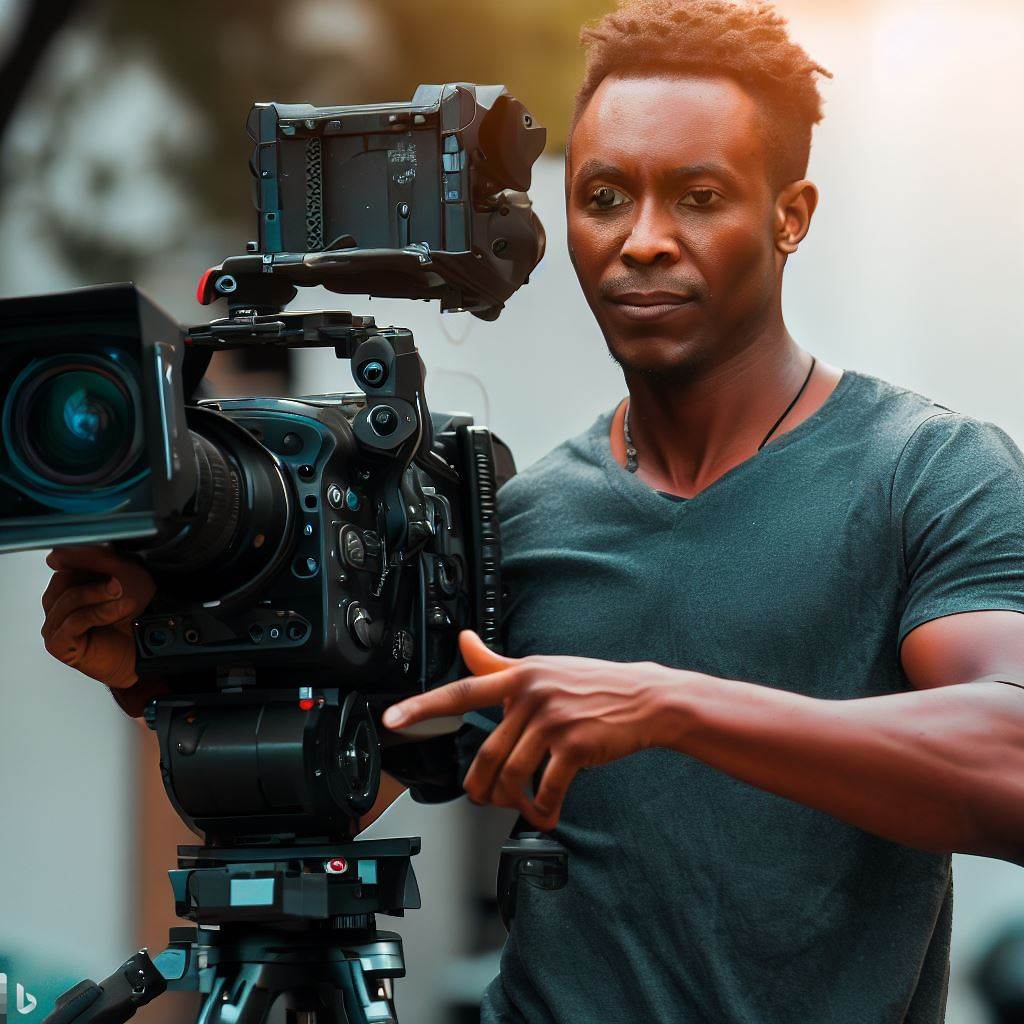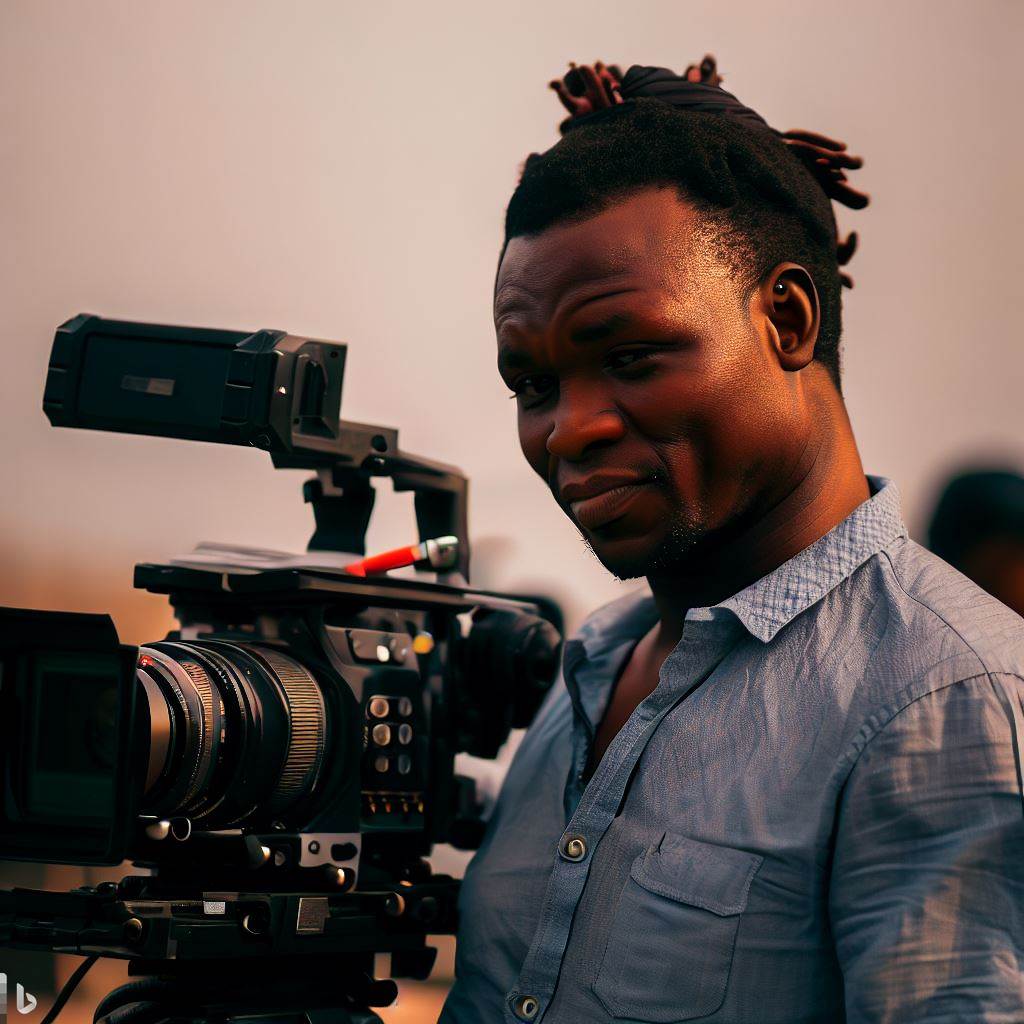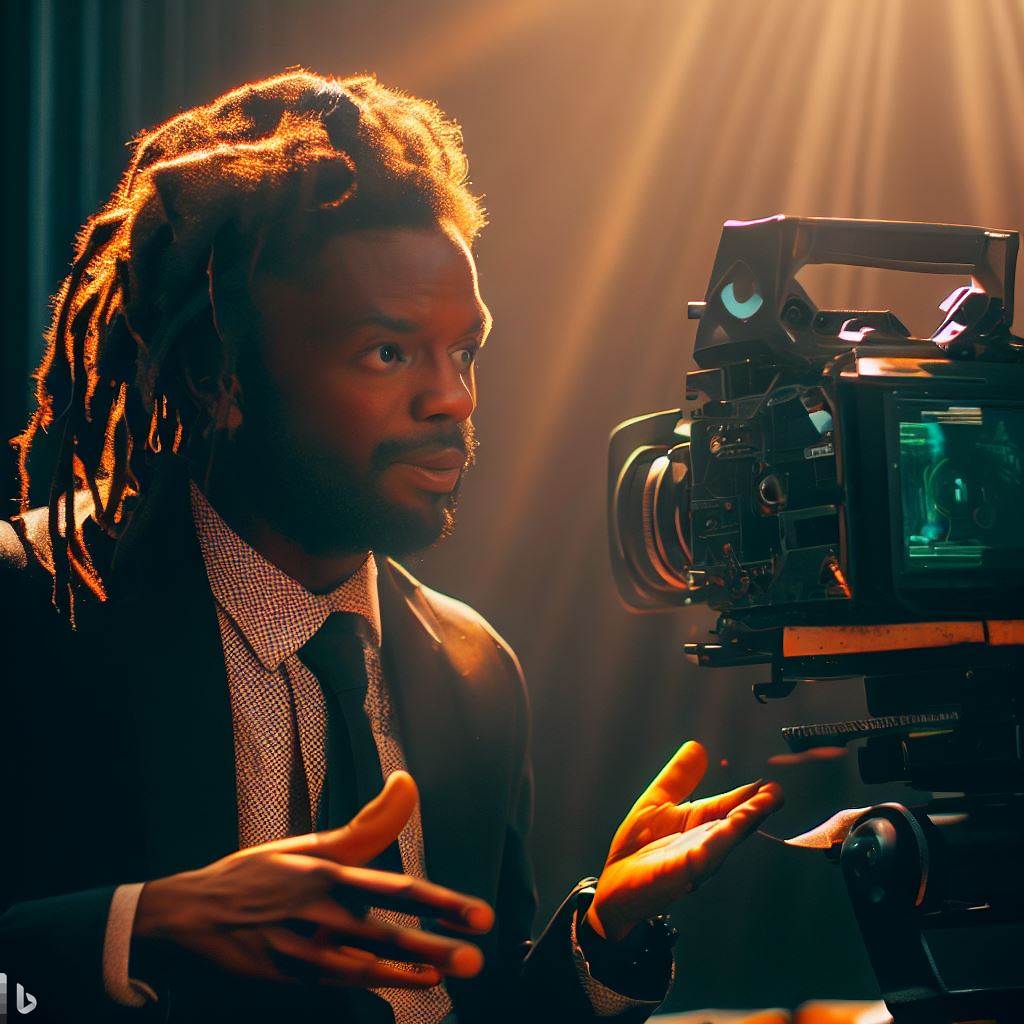Introduction
A cinematographer, often called a director of photography (DP), is a key player in filmmaking.
They capture the visual essence of a movie, ensuring each frame tells the story.
Cinematographers hold immense importance in the film industry, contributing significantly to a film’s success.
What Does a Cinematographer Do?
- Visual Storytelling: Cinematographers use camera angles, lighting, and framing to convey emotions, themes, and plot.
- Technical Mastery: They operate cameras, lenses, and equipment, ensuring the highest quality shots.
- Collaboration: Cinematographers work closely with directors to realize their vision.
- Lighting Expertise: They manipulate light to create mood and atmosphere.
- Composition: Cinematographers frame shots, considering the rule of thirds, leading lines, and symmetry.
Importance of Cinematography in the Film Industry
- Visual Impact: Cinematography determines a film’s visual appeal, captivating the audience.
- Storytelling: It enhances narrative depth, conveying subtext and character development.
- Immersive Experience: A skilled cinematographer immerses viewers in the story, making it more relatable.
- Aesthetic Value: Cinematography elevates films into art, garnering critical acclaim and awards.
In Nigeria’s budding film industry, mastering these skills is essential for aspiring cinematographers, unlocking endless creative possibilities.
Technical Skills
Knowledge of camera equipment and accessories
- Having knowledge of camera equipment and accessories is crucial for a cinematographer in Nigeria.
- Understanding different camera types and their functionalities is essential for capturing high-quality footage.
- Proficiency in framing shots and executing smooth camera movements is vital for creating visually appealing content.
- The ability to use lighting techniques effectively is necessary for achieving proper exposure and setting the desired mood.
- Expertise in post-production editing and color grading is essential for enhancing the overall visual aesthetics of the final product.
A cinematographer in Nigeria needs to possess a wide range of technical skills to excel in their profession.
These skills are crucial for capturing high-quality footage and creating visually stunning films.
In this section, we will explore the essential technical skills that every aspiring cinematographer should strive to develop.
Understanding of different camera types and their functionalities
First and foremost, a deep knowledge of camera equipment and accessories is vital.
This includes understanding the different types of cameras available in the market, their specifications, and the various accessories that can be used to enhance their functionality.
A cinematographer must be familiar with different camera brands and models to choose the most suitable equipment for each project.
Proficiency in framing shots and camera movements
In addition to camera knowledge, a cinematographer must also have a solid understanding of the functionalities of different camera types.
This includes knowledge of DSLRs, mirrorless cameras, and cinema cameras.
Each type has its own unique features and capabilities, and knowing how to leverage them can greatly enhance the visual storytelling.
Framing shots and executing smooth camera movements are essential skills for a cinematographer.
The ability to compose a shot effectively and frame the subject in a visually pleasing way is crucial for capturing the audience’s attention.
Furthermore, knowing how to execute camera movements such as pans, tilts, and tracking shots adds dynamism and cinematic quality to the footage.
Ability to use lighting techniques effectively
Lighting techniques play a vital role in cinematography.
A cinematographer must be proficient in using different lighting setups and techniques to achieve the desired look and feel of a scene.
This includes knowledge of various types of lights, their positioning, and how to control their intensity. Proper lighting can greatly enhance the overall mood and atmosphere of a film.
Expertise in post-production editing and colour grading
Expertise in post-production editing and colour grading is another essential skill for a cinematographer.
During the editing process, a cinematographer must have the ability to make precise cuts, arrange sequences, and add visual effects to enhance the storytelling.
Additionally, having knowledge of colour grading techniques allows a cinematographer to manipulate the colour and tone of the footage to achieve the desired aesthetic.
Generally, technical skills are paramount for becoming a successful cinematographer in Nigeria.
Knowledge of camera equipment and accessories, understanding different camera types, proficiency in framing shots and camera movements.
Ability to use lighting techniques effectively, and expertise in post-production editing and colour grading are all crucial for capturing visually stunning footage.
By continuously honing these skills, aspiring cinematographers can elevate their craft and produce compelling visual narratives.
Read: Mixing Engineer vs. Mastering Engineer: Roles in Nigeria’s Music
Creative Skills
- Visualizing and interpreting a script or director’s vision is an essential skill for a cinematographer.
- Composing aesthetically pleasing shots requires a strong sense of composition and framing.
- A cinematographer must have an aptitude for capturing emotions and conveying storytelling through visuals.
- Utilizing different camera angles and perspectives creatively adds depth and interest to a film.
- Thinking outside the box and experimenting with unique shots can make a cinematographer stand out.
When it comes to becoming a successful cinematographer in Nigeria, having a strong set of creative skills is crucial.
This is because cinematography is an art form that requires the ability to not only capture visuals but also evoke emotions and convey storytelling through those visuals.
Here are some of the important creative skills that every aspiring cinematographer should develop:
1. Visualizing and Interpreting a Script or Director’s Vision
One of the primary responsibilities of a cinematographer is to bring the director’s vision or the script to life through visuals.
This requires the ability to read and understand the script, visualise the scenes, and translate them into compelling shots.
Being able to interpret the director’s vision and understand their creative intentions is crucial for delivering the desired cinematic experience.
2. Composing Aesthetically Pleasing Shots
The composition of a shot can greatly impact its visual appeal.
A cinematographer must have a keen eye for framing and be able to create aesthetically pleasing shots.
This involves considering elements such as the rule of thirds, balance, symmetry, and leading lines to create visually striking and harmonious compositions.
3. Capturing Emotions and Conveying Storytelling
A skilled cinematographer can capture emotions and enhance storytelling through their visuals.
They understand the power of visual language and use it to evoke specific emotional responses from the audience.
By strategically choosing camera angles, lighting, and movement, cinematographers can enhance the narrative and immerse the viewers in the story.
4. Creative Use of Different Camera Angles and Perspectives
Exploring various camera angles and perspectives adds depth and visual interest to a film.
A cinematographer should have the ability to experiment with different angles, including low-angle, high-angle, and unconventional perspectives.
By choosing the right angles, they can emphasise certain aspects of the scene, create unique visual dynamics, and provide a fresh perspective to the audience.
5. Thinking Outside the Box and Experimenting with Unique Shots
To stand out as a cinematographer in Nigeria’s competitive film industry, it is essential to think outside the box and experiment with unique shots.
This involves challenging conventions, embracing innovative techniques, and pushing creative boundaries.
By taking risks and being open to unconventional approaches, cinematographers can differentiate themselves and leave a lasting impression.
Creative skills play a pivotal role in the success of a cinematographer in Nigeria.
The ability to visualise and interpret a script, compose aesthetically pleasing shots, convey storytelling through visuals, use different camera angles creatively.
And think outside the box are all essential for creating captivating and memorable cinematic experiences.
Aspiring cinematographers should continuously hone their creative skills to excel in this dynamic and ever-evolving field.
Read: Skills Needed to Thrive as an Artists’ Manager in Nigeria

Communication Skills
Effective communication is a crucial skill for anyone aspiring to become a successful cinematographer in Nigeria.
In this section, we will explore the essential aspects of communication that cinematographers should possess to excel in their craft.
Effective communication with directors, producers, and other crew members
As a cinematographer, you will collaborate closely with directors, producers, and various crew members.
It is essential to establish clear and effective communication channels with them.
This involves actively listening to their instructions, ideas, and concerns, and articulating your suggestions and feedback in a concise and assertive manner.
Sustaining open communication ensures all involved stay aligned, working together for the envisioned visual outcome in filmmaking.
Ability to understand and translate director’s vision into visual concepts
One of the primary responsibilities of a cinematographer is to understand the director’s vision and translate it into visual concepts.
This requires actively engaging in discussions with the director to gain a clear understanding of their desired mood, tone, and aesthetic for each scene.
Once you comprehend the director’s vision, you must effectively communicate your technical knowledge and creative ideas to bring that vision to life.
This may involve discussing camera angles, lighting techniques, and lens choices to achieve the desired emotional impact on the audience.
Clear and concise communication with actors regarding framing and movements
A cinematographer must have the ability to communicate effectively with actors.
You will often work closely with them to determine their positioning, framing, and movements within a shot.
Clear and concise instructions are crucial to ensure that the actors understand their role in the overall composition of the scene.
Offering actors exact cues for positions, movement, and their camera interactions yields dynamic, compelling performances that enrich storytelling.
Collaborative approach towards working with other departments
Excellent communication skills are also essential when collaborating with other departments involved in the film-making process.
Departments such as costume and set design work closely with cinematographers to create a cohesive visual narrative.
By fostering a collaborative approach, cinematographers can effectively express their visual ideas, offer suggestions, and understand the constraints and requirements of other departments.
This collaborative synergy ensures that all elements of the production align harmoniously, resulting in a visually stunning cinematic experience.
Basically, mastering communication skills is vital for cinematographers striving to succeed in the Nigerian film industry.
Effective communication enables cinematographers to collaborate seamlessly with directors, producers, actors, and other crew members, ensuring that everyone’s creative vision is realised on screen.
Cinematographers grasp and transform the director’s vision, guide actors, and collaborate across departments, elevating their craft significantly.
Read: Influence of Nigerian Mixing Engineers on Global Music Scene
Problem-solving and Adaptability
Being a cinematographer in Nigeria requires more than just technical skills and artistic vision.
It also demands problem-solving abilities and adaptability to overcome various challenges that may arise during shoots.
Ability to troubleshoot technical issues on set
One of the crucial skills for a cinematographer is the capability to troubleshoot technical problems that may occur on set.
Whether it’s a malfunctioning camera, lighting issues, or audio problems, being able to diagnose and solve these issues quickly is paramount.
Quick thinking and problem-solving skills to overcome challenges during shoots
No shoot is perfect, and obstacles are inevitable.
A cinematographer must have quick thinking and problem-solving skills to address these challenges effectively.
Whether it’s finding alternative camera angles or adjusting lighting setups, the ability to think on your feet is crucial.
Adaptability to different shooting conditions and environments
Nigeria offers diverse shooting locations and conditions, from urban landscapes to rural areas.
As a cinematographer, being adaptable to different shooting conditions and environments is vital.
It involves adjusting camera settings, framing shots, and utilising available resources to capture the desired visual narrative.
Flexibility in adjusting to unexpected changes during production
Production plans often change unexpectedly, and a cinematographer must be flexible in adapting to these changes efficiently.
It could be due to weather conditions, actor availability, or other unforeseen circumstances.
The ability to adjust lighting, camera setups, and shot compositions quickly is necessary to maintain the desired visual aesthetics.
Capacity to find creative solutions within budget limitations
Working within budget limitations is a common challenge in the Nigerian film industry.
A skilled cinematographer must have the capacity to find creative solutions to achieve the desired visual style without exceeding the allocated budget.
This may involve innovative lighting techniques, using cost-effective equipment, or exploring alternative shooting strategies.
Problem-solving and adaptability are indispensable skills for cinematographers in Nigeria.
They enable cinematographers to overcome technical issues, tackle challenges during shoots, adjust to various shooting conditions, and find creative solutions within budget limitations.
By honing these skills, cinematographers can enhance the quality of their work and deliver visually captivating storytelling.
Read: Investigative Journalism in Nigeria: A Closer Look
Organisation and Time Management
Organisation and time management are essential skills for becoming a successful cinematographer in Nigeria.
As a cinematographer, you will be responsible for planning and organising shooting schedules.
Managing time efficiently during shoots, coordinating camera equipment and personnel, and maintaining and organising camera gear and accessories.
Additionally, you will need to have multitasking abilities to handle multiple projects and deadlines.
Skill in planning and organising shooting schedules
One of the key skills required for a cinematographer is the ability to plan and organise shooting schedules.
This involves creating a detailed timeline for the entire production, including pre-production, production, and post-production phases.
By carefully planning the shooting schedule, you can ensure that all scenes are captured in the most efficient and cost-effective manner.
Ability to manage time efficiently during shoots
A cinematographer must have excellent time management skills during shoots.
This involves being able to prioritise shots, anticipate potential delays, and adapt to changes on set.
By efficiently managing time, you can ensure that the production stays on schedule and the director’s vision is captured effectively.
Attention to detail in coordinating camera equipment and personnel
Coordinating camera equipment and personnel requires attention to detail.
A cinematographer must ensure that all necessary equipment is available and in working order.
This includes cameras, lenses, lighting equipment, and any other accessories required for the shoot.
Additionally, the cinematographer must coordinate with the camera crew, gaffers, grips, and other personnel to ensure everyone is on the same page.
Proper maintenance and organisation of camera gear and accessories
As a cinematographer, it is crucial to properly maintain and organise camera gear and accessories.
This includes cleaning lenses, ensuring batteries are charged, and properly storing equipment to prevent damage.
By taking care of your gear, you can avoid technical issues during shoots and ensure the highest quality footage.
Multitasking abilities to handle multiple projects and deadlines
In the fast-paced world of cinematography, multitasking is essential.
As a cinematographer, you may be working on multiple projects simultaneously, each with its own unique requirements and deadlines.
By effectively multitasking, you can ensure that each project receives the attention and dedication it deserves.
Lastly, organisation and time management are vital skills for aspiring cinematographers in Nigeria.
By mastering these skills, you can efficiently plan and execute shooting schedules, coordinate camera equipment and personnel, and handle multiple projects and deadlines.
These skills will not only make you a valuable asset in the film industry but also contribute to the success of your projects.
Conclusion
Recap
Becoming a successful cinematographer in Nigeria requires a range of essential skills.
These skills include technical proficiency in using cameras, lighting, and composition.
Additionally, cinematographers must possess a keen eye for detail and be able to anticipate and capture the perfect shot.
Importance of continuously improving and honing these skills
Continuously improving and honing these skills is crucial for cinematographers to stay competitive in the industry.
With advancements in technology and evolving storytelling techniques, it is essential to stay updated and adapt to new trends and styles.
Encouragement to aspiring cinematographers
Aspiring cinematographers should not be discouraged by the challenges they may face in acquiring these skills.
Instead, they should be encouraged to pursue their passion and develop these skills through practice and experience.
Attending workshops, working on film sets, and collaborating with other professionals can provide invaluable learning opportunities.
Ultimately, the journey to becoming a successful cinematographer in Nigeria is a continuous process of growth and development.
With hard work, dedication, and a willingness to learn, aspiring cinematographers can carve out a successful career in the industry.
The key is to never stop learning, always strive for improvement, and embrace the creative process.
So, aspiring cinematographers, go out there and pursue your dreams.
Develop these essential skills, immerse yourself in the world of cinematography, and let your passion and talent shine through.
Success in the industry is within your grasp.




